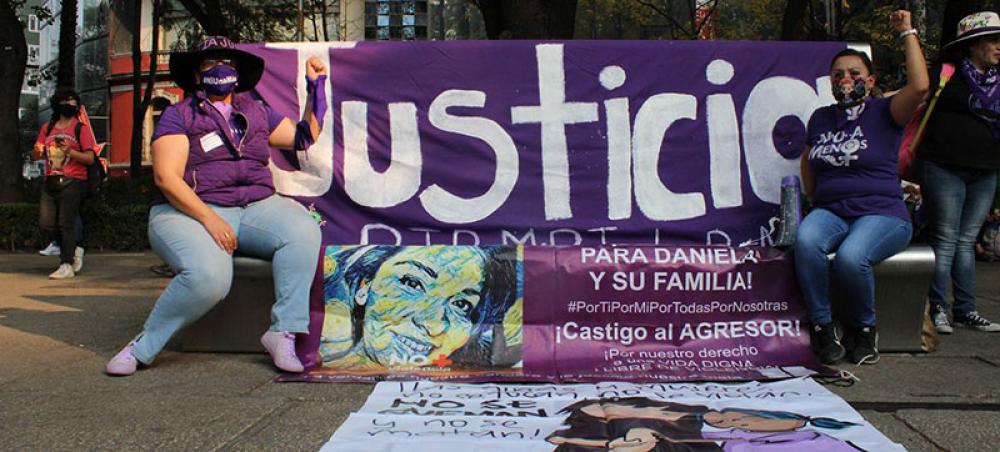Just Earth News | @justearthnews | 17 Dec 2021

Image: Primavera Diaz
New York: Whether at home, at work, in the streets or even online, women and girls across the world remain highly vulnerable to gender-based violence, something which the COVID-19 pandemic has only magnified, six senior UN women leaders said on Thursday.
The top officials, who included Deputy Secretary-General Amina Mohammed and heads of key UN agencies, examined ways to end this “invisible emergency” during a roundtable discussion held from UN Headquarters in New York.
The frank and open conversation was organized by the Spotlight Initiative, a joint UN and European Union (EU) programme working to eradicate violence against women and girls. 
‘Clear and present danger’
In a video opening the discussion, the UN deputy chief described gender-based violence as a “clear and present danger” for millions of women and girls worldwide.
Moderator Melissa Fleming, head of the UN Department of Global Communications (DGC), asked her about the impact of women being targeted, including on achieving the Sustainable Development Goals (SDGs).
“Essentially, what it does is put all the SDGs at risk,” said Ms. Mohammed. “Because without 50 per cent of humanity being covered by this - whether it is ending poverty, access to education, or a decent job - all of it is in jeopardy.”
Not so invisble
Gender-based violence permeates all aspects of life, whether public or private, said Reem Alsalem, an independent UN human rights expert. It also begins early, in childhood, representing a “continuum” of violence.
“That’s why I also ask myself whether we are really talking about an invisible emergency in the sense that it is quite visible for those who want to see it,” said Ms. Alsalem, who is the UN Special Rapporteur on violence against women.
“It’s a bit like the climate crisis. The evidence is there. We can see it, we can see the consequences.”
The discussion served as a coda to the 16 Days of Activism against Violence against Women, an annual global campaign that runs from 25 November through 10 December, Human Rights Day.
COVID-19 drastically increased the amount of gender-based violence around the world, though any statistics are under reported, according to Natalia Kanem, Executive Director of the UN Population Fund (UNFPA).
Rising use of technology during the pandemic also created an online “danger zone” for women and girls, she said, where they were hounded and harassed.
Afraid to speak out
This issue was also raised by Henrietta Fore, Executive Director of the UN Children’s Fund (UNICEF), who spoke of the risks young and adolescent girls face online, such as grooming and sexting, which can damage their mental health.
The UN has described the spike in gender-based violence that accompanied the spread of COVID-19 as a “shadow pandemic”. But even with the increase in incidents, women have been reluctant to speak up about the abuse they have suffered.
A UN Women survey of 16,000 women in 13 countries found that while one in two said they, or a woman they know, fell victim to some form of violence since the onset of the pandemic, only one in 10 reported the matter to the police.
Twice victimized
Furthermore, data from the UN Office on Drugs and Crime (UNODC) revealed that last year, 47,000 women and girls were killed by intimate partners or family members.
For Sima Bahous, the newly appointed UN Women Executive Director, women’s low level of trust in institutions that are supposed to protect them was a concern. She feared that women were being victimized twice.
“First, they experience the violence. Then they experience the lack of support services and justice that they are seeking. And, many times they find that even when reported, and even when they have access, the perpetrators are very seldom brought to justice,” she said.
Ending the ‘conspiracy of silence’
The UN and its partners continue to work to dismantle what some of the participants called the “conspiracy of silence” surrounding violence against women and girls, and to ensure they can raise their voices.
Through the Spotlight Initiative, some 650,000 women and girls were able to access services despite the ongoing pandemic.
Ms. Fore also highlighted examples of UNICEF activities in countries such as Mexico, where the agency brokered a partnership with the Government and the hospitality sector to provide safe shelters in hotels for women survivors and their children, critical during the pandemic.
Meanwhile, in Iraq, Ecuador and Lebanon, UNICEF created virtual safe spaces to increase access to services and information for women and girls, particularly those with disabilities or facing other forms of marginalization.
“Could these initiatives and many, many others get scaled up in the world? Yes," was the answer from Ms. Fore, adding that the Spotlight Initiative has served as a good collaborative space for UN agencies.
Ms. Mohammed underscored the importance of using UN human rights mechanisms, such as periodic reviews of country situations, as a tool for action.
She added that not only must survivors be supported, but also those who speak up for them, or who speak out against gender-based violence, including men, boys and national leaders.
“There are Presidents who are speaking on this, really big leaders. We don’t want it just to be a one-off because it is the 16 Days of orange,” she said. “It needs to be Presidents speaking on that every day.”
Ghada Waly, the UNODC chief, pointed to another positive development that emerged from the pandemic. Governments now realize that they must invest in digitization and online platforms, or “e-platforms”, including for justice. She also highlighted more areas for improvement.
“We know women are safer when you have more police women, when you have more women judges, when you have equity and gender representation in those making the decisions and receiving the call for help.”